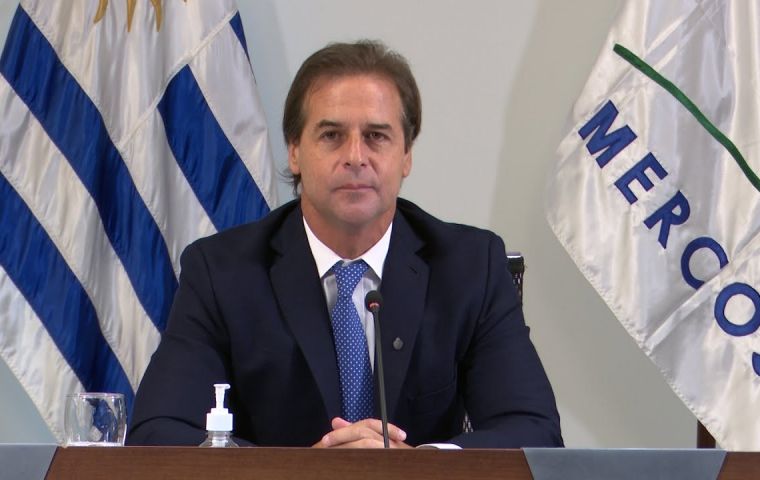MercoPress. South Atlantic News Agency
Uruguay insists it has no intention of infringing Mercosur rules, just increasing trade opportunities
 “The world is not going to wait for us. Thus calmly we want to tell you that Uruguay is heading that way, and hopefully we can do it jointly”, Lacalle Pou told his peers during the video conference.
“The world is not going to wait for us. Thus calmly we want to tell you that Uruguay is heading that way, and hopefully we can do it jointly”, Lacalle Pou told his peers during the video conference. The Mercosur trade block, now under the chair of Brazil for the next six months, will be facing one of its most significant potential disruption challenges after the virtual summit with the presidents of the four founding members openly exposing their differences, despite a limited coverage of the event.
In effect, Uruguayan president Luis Lacalle Pou confirmed on Thursday that his country would go ahead with its decision to reach trade agreements with third partners, outside the group, which is somehow is limited by Mercosur rule 32 since all decisions must be consensual.
“The world is not going to wait for us. Thus calmly we want to tell you that Uruguay is heading that way, and hopefully, we can do it jointly”, Lacalle Pou told his peers during the video conference. Uruguay's position was addressed to Argentina which point-blank defends the rules established by the group thirty years ago under the Asunción Treaty.
Brazil on the other hand is pushing for more flexibility in negotiations and a reduction of the Common External Tariff. Paraguay plays a low key but, as a small market, is closer to Uruguay.
The storm has been brewing for a long time and all members now seem to agree on flexibility for trade talks with third countries, except for Argentina, which fears for its auto and textile industries. Brazil before current president Bolsonaro held a similar position, strongly lobbied by industry and unions, but with the country's economy under the guidance of open markets advocate minister Paulo Guedes is convinced of the need to lower the Common External Tariff, more flexibility and a less bureaucratic Mercosur.
However, Uruguay which had advanced its position on the eve of the summit to the surprise of its partners, during the presidential debate stated that this not mean breaking with Mercosur since “this does not mean infringing or forcing the consensus rule”, as established for the group's decisions. “The ultimate objective is belonging to the block”, underlined Lacalle Pou. But Argentine president Alberto Fernandez, without naming the Uruguayan leader, recalled that the Mercosur founding Treaty of Asunción indicates that any trade negotiation must begin and end jointly and secondly that any proposal must be based on the rule of consensus“.
Brazil's Bolsonaro, no friend of president Fernandez or his mentor Cristina Kirchner which he has repeatedly described as crooks, underlined that Mercosur needs to review the Common External Tariff and adopt more flexibility in negotiations with third countries or blocks. The Brazilian president also severely criticized the Mercosur six month rule of Argentina arguing that partners' ”expectations and the need to modernize the block“ were not met. He added that ”we can't let Mercosur be seen as a synonym of inefficiency, of a waste of opportunities and commercial restrictions“. He anticipated that with Brazil in the chair, until the end of the year, Mercosur will address the modernization of its economic agenda.
But Brazil is also vulnerable and wishes will demand many negotiations. Argentina is one of Brazil's main trade partners, with a consistent ample surplus, and the National Confederation of Industry and unions have warned that Uruguay' 'rupture' attitude does not help the block. ”Yes, Mercosur needs adjustments and perfections but it is also the one which most economic and social benefits it provides for Brazil“.
Even though the Argentine government only broadcasted president Fernandez opening speech, ignoring Lacalle Pou, Bolsonaro who was the most aggressive in his exposure of what he considered Argentina's shortcomings and incapacity during its tenure of the Mercosur chair in the first half of 2021, also helped to soothe an otherwise tense atmosphere with a reference to the beautiful sport. Bolsonaro underlined that, honestly, the only rivalry with Argentina is football and extending his open hand to the television camera said, ”we are going to beat them 5-nil on Sunday at the Maracana stadium in America's Cup final match“.
Reports in Montevideo media indicate that President Lacalle Pou during a recent visit to Brasilia mentioned the fact that Uruguay would be moving towards attempting a trade agreement with China, who happens to be three of Mercosur's founding members main trade partners, and ”received a positive nod from the Bolsonaro administration”. But as it has recurrently happened with Mercosur issues, politics is a decisive ingredient. In Argentina, midterm elections are scheduled in October, and a presidential race next year in Brazil. Opinion polls are falling for Bolsonaro, despite the economy beginning to pick up, and we shouldn't be surprised if the former army officer does not implement another 'family' subsidies, money or food, program, as during the pandemic, which while lasted had him king of polls.
Uruguay in the meantime can keep exploring the possibility of new trade opportunities with third countries or blocks, momentarily forgetting rule 32 which as in good consensus spirit does not anticipate notifications or sanctions.




Top Comments
Disclaimer & comment rulesCommenting for this story is now closed.
If you have a Facebook account, become a fan and comment on our Facebook Page!